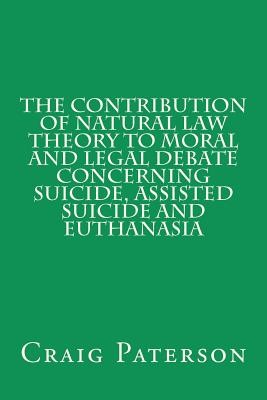
- We will send in 10–14 business days.
- Author: Craig Paterson
- Publisher: CreateSpace Independent Publishing Platform
- ISBN-10: 1452868395
- ISBN-13: 9781452868394
- Format: 15.2 x 22.9 x 2.1 cm, minkšti viršeliai
- Language: English
- SAVE -10% with code: EXTRA
The Contribution of Natural Law Theory to Moral and Legal Debate Concerning Suicide, Assisted Suicide, and Euthanasia (e-book) (used book) | bookbook.eu
Reviews
Description
In chapter one, Paterson argues for the important contribution that a natural law based framework can make towards an analysis of key controversies surrounding the practices of suicide, assisted suicide, and voluntary euthanasia. In the second chapter, he considers a number of historical contributions to the debate. The third chapter takes up the modern context of ideas that have increasingly come to the fore in shaping the 'push' for reform. Particular areas focused upon include the value of human life, the value of personal autonomy, and the rejection of double effect reasoning. In chapter four, Paterson engages in the task of pointing out structural weakness in utilitarianism and deontology. He argues that major systemic weaknesses in both approaches can be overcome by a teleology of basic human goods. In chapter five, Paterson argues for the defence of the intrinsic good of human life from direct attack. He defends the proposition "it is always a serious moral wrong to intentionally kill a human person, whether self or another, regardless of a further appeal to consequences or motive." In chapter six, Paterson argues that the natural law conception of the person in society, centred on the common good, provides a solid framework for assessing both the justification for, as well as the limits on, the role of the state to use its power to legally impose certain moral standards. In chapter seven, he addresses the concrete relationship between natural law and legal policy by exploring the issue of assisted suicide in the constitutional context of the United States.
EXTRA 10 % discount with code: EXTRA
The promotion ends in 21d.18:30:28
The discount code is valid when purchasing from 10 €. Discounts do not stack.
- Author: Craig Paterson
- Publisher: CreateSpace Independent Publishing Platform
- ISBN-10: 1452868395
- ISBN-13: 9781452868394
- Format: 15.2 x 22.9 x 2.1 cm, minkšti viršeliai
- Language: English English
In chapter one, Paterson argues for the important contribution that a natural law based framework can make towards an analysis of key controversies surrounding the practices of suicide, assisted suicide, and voluntary euthanasia. In the second chapter, he considers a number of historical contributions to the debate. The third chapter takes up the modern context of ideas that have increasingly come to the fore in shaping the 'push' for reform. Particular areas focused upon include the value of human life, the value of personal autonomy, and the rejection of double effect reasoning. In chapter four, Paterson engages in the task of pointing out structural weakness in utilitarianism and deontology. He argues that major systemic weaknesses in both approaches can be overcome by a teleology of basic human goods. In chapter five, Paterson argues for the defence of the intrinsic good of human life from direct attack. He defends the proposition "it is always a serious moral wrong to intentionally kill a human person, whether self or another, regardless of a further appeal to consequences or motive." In chapter six, Paterson argues that the natural law conception of the person in society, centred on the common good, provides a solid framework for assessing both the justification for, as well as the limits on, the role of the state to use its power to legally impose certain moral standards. In chapter seven, he addresses the concrete relationship between natural law and legal policy by exploring the issue of assisted suicide in the constitutional context of the United States.


Reviews